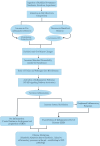Exploring the Long-Term Effect of Artificial Sweeteners on Metabolic Health
- PMID: 39449954
- PMCID: PMC11501561
- DOI: 10.7759/cureus.70043
Exploring the Long-Term Effect of Artificial Sweeteners on Metabolic Health
Abstract
Artificial sweeteners (ASs) are widely used as low-calorie sugar substitutes for managing conditions like diabetes and obesity, but recent evidence suggests their health effects may be more complex than previously understood. High consumption has been associated with increased risks of metabolic disorders, cardiovascular diseases, certain cancers, and, somewhat paradoxically, weight gain, adverse pregnancy outcomes, and potential risks for individuals with low seizure thresholds. Studies, including the Women's Health Initiative, have linked artificially sweetened beverages to an elevated risk of stroke, coronary heart disease, and mortality, independent of established risk factors. Concerns extend to gut health, where ASs like saccharin have been linked to inflammatory bowel diseases, gut microbiota disruption, increased intestinal permeability, and dysbiosis, leading to metabolic disturbances such as impaired glucose tolerance, insulin resistance, and heightened systemic inflammation. These disruptions reduce the production of short-chain fatty acids crucial for insulin sensitivity, further contributing to the development of metabolic disorders like type 2 diabetes mellitus. Given these potential health risks, this review underscores the need for cautious use, informed consumer choices, and stringent regulatory oversight, while emphasizing the necessity for further research to elucidate long-term health effects and develop strategies to mitigate these risks.
Keywords: artificial sweeteners; dysbiosis; health risks; metabolic; obesity; type 2 diabetes.
Copyright © 2024, M et al.
Conflict of interest statement
Conflicts of interest: In compliance with the ICMJE uniform disclosure form, all authors declare the following: Payment/services info: All authors have declared that no financial support was received from any organization for the submitted work. Financial relationships: All authors have declared that they have no financial relationships at present or within the previous three years with any organizations that might have an interest in the submitted work. Other relationships: All authors have declared that there are no other relationships or activities that could appear to have influenced the submitted work.
Figures






References
-
- Sugar-sweetened beverages exacerbate high-fat diet-induced inflammatory bowel disease by altering the gut microbiome. Shon WJ, Jung MH, Kim Y, Kang GH, Choi EY, Shin DM. J Nutr Biochem. 2023;113:109254. - PubMed
-
- Toxicological and nutraceutical screening assays of some artificial sweeteners. Mateo-Fernández M, González-Jiménez MJ, Celestino MDR, Font R, Alonso-Moraga Á, Merinas-Amo T. Processes. 2022;10:410.
Publication types
LinkOut - more resources
Full Text Sources
Miscellaneous
